Opinions & Interviews
Belarusian-Chinese invention patent exchange suggested
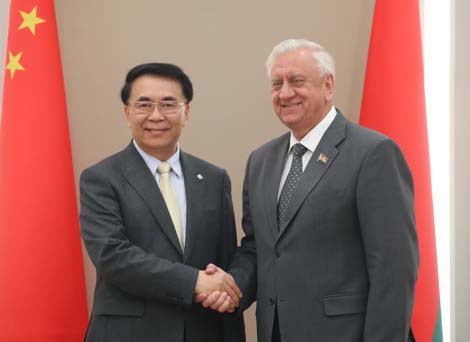
MINSK, 25 May (BelTA) – A Belarusian-Chinese exchange for invention patents and commercial prototypes may be created. Chairman of the Council of the Republic of the National Assembly of Belarus Mikhail Myasnikovich put forward the proposal as he met with a Chinese delegation led by President of the Chinese Academy of Sciences Bai Chunli, BelTA has learned.
Mikhail Myasnikovich said: “Millions of international property objects have been created both in China and Belarus. I would like to suggest opening a Belarusian-Chinese exchange for invention patents and commercial prototypes so that we could transfer technologies according to the established procedure. The Belarusian parliament could expand the legislation on copyright and other regulatory acts, which regulate technology transfer.”
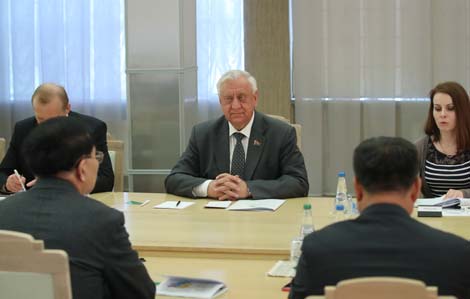 The head of the upper chamber of the Belarusian parliament intends to visit China in autumn 2018. “Legislation on the transfer of new knowledge and technologies can be discussed with representatives of the National People’s Congress of China,” added Mikhail Myasnikovich.
The head of the upper chamber of the Belarusian parliament intends to visit China in autumn 2018. “Legislation on the transfer of new knowledge and technologies can be discussed with representatives of the National People’s Congress of China,” added Mikhail Myasnikovich.
“We also expect that the scientific communities of Belarus and China will add daring initiatives to projects of the China-Belarus industrial park Great Stone and projects of the Silk Road Economic Belt. It seems to me that matters of scientific and technical activities can be seriously improved thanks to these two large initiatives. Moreover, very good conditions have been created for these global projects: preferential taxation, adequate funding, and many other preferences,” noted Mikhail Myasnikovich.
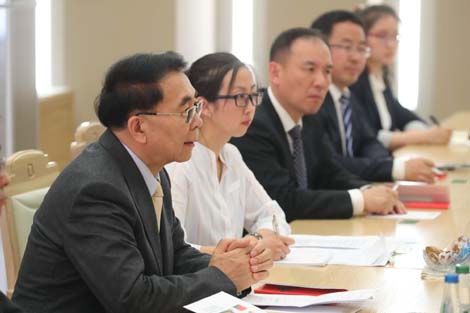 Chairman of the Presidium of the National Academy of Sciences of Belarus Vladimir Gusakov and President of the Chinese Academy of Sciences Bai Chunli have discussed the advancement of Belarus-China scientific cooperation this week. “The parliament supports the achieved agreements and will enable the necessary comfortable conditions for implementing joint projects,” stressed Mikhail Myasnikovich.
Chairman of the Presidium of the National Academy of Sciences of Belarus Vladimir Gusakov and President of the Chinese Academy of Sciences Bai Chunli have discussed the advancement of Belarus-China scientific cooperation this week. “The parliament supports the achieved agreements and will enable the necessary comfortable conditions for implementing joint projects,” stressed Mikhail Myasnikovich.
According to Mikhail Myasnikovich, the Chinese Academy of Sciences and the National Academy of Sciences of Belarus can work together not only on research projects but on manufacturing ones, too. “Today’s world is oversupplied with goods and services. Consumers have every opportunity to choose the best. This is why the economy of a country can be competitive only if innovations lie at its core. Success is possible only if the synergy of new knowledge and the manufacturing sector is assured. The production sector able to set research goals, form the market of new professions, and rely on results of fundamental and applied research can be the development driver,” stated Mikhail Myasnikovich.
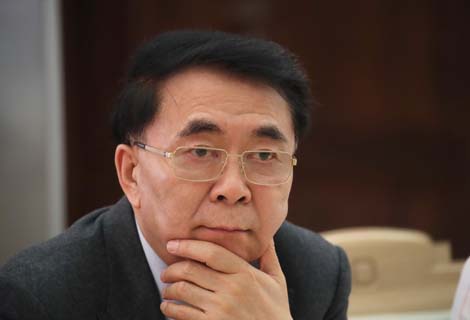 President of the Chinese Academy of Sciences Bai Chunli mentioned China’s interest in bilateral R&D cooperation with Belarus. Space exploration and nanotechnologies are particularly interesting for the Chinese side.
President of the Chinese Academy of Sciences Bai Chunli mentioned China’s interest in bilateral R&D cooperation with Belarus. Space exploration and nanotechnologies are particularly interesting for the Chinese side.
A delegation of the Chinese Academy of Sciences is in Belarus on 22-26 May. The key purpose of the visit is to discuss promising avenues of Belarus-China R&D cooperation.
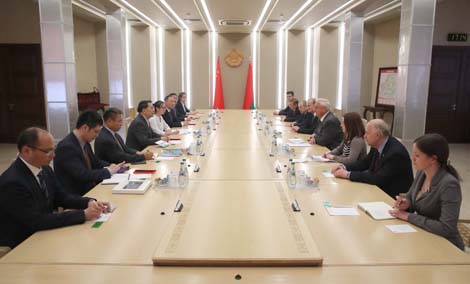 The Chinese Academy of Sciences is the supreme research institution of the People’s Republic of China, the country’s leading center for fundamental research in the area of natural sciences. It was established in Beijing on 1 November 1949. Over 67,900 people participate in research efforts in the academy these days, including about 56,000 professional researchers and scientists. Of them some 22,800 are professors or associate professors. Bai Chunli has been running the academy since 2011. The academy is subdivided into five branches, which focus on math, physics, chemistry, engineering, and earth sciences. The Chinese Academy of Sciences comprises 104 research institutes, 12 industry-specific academies, and three universities.
The Chinese Academy of Sciences is the supreme research institution of the People’s Republic of China, the country’s leading center for fundamental research in the area of natural sciences. It was established in Beijing on 1 November 1949. Over 67,900 people participate in research efforts in the academy these days, including about 56,000 professional researchers and scientists. Of them some 22,800 are professors or associate professors. Bai Chunli has been running the academy since 2011. The academy is subdivided into five branches, which focus on math, physics, chemistry, engineering, and earth sciences. The Chinese Academy of Sciences comprises 104 research institutes, 12 industry-specific academies, and three universities.







 print version
print version make home page
make home page add to bookmarks
add to bookmarks

